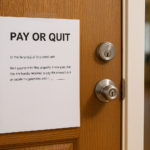When trusting your properties to renters, it is imperative to establish a clear and fair rent collection policy as part of the lease. A good rent collection policy encourages healthy tenant and landlord relationships as expectations are set and questions surrounding the processes are eliminated. There are several important components to a solid rent collection policy. The following questions should be answered:
- When is rent due?
- How will rent be collected?
- When is rent considered late?
- How are rent payments documented?
- What fees are imposed on late payment?
- When will the eviction process start?
When is rent due?
One of the most vital components of your rent collection policy is the due date. The most common being the first of the month or the first business day of the month. However, just because something is standard, doesn’t mean it’s right for you or your renter. Consider asking about their preferences when it comes to the due date. They might get paid on an unusual schedule and want to request an adjustment.
How will rent be collected?
Landlords are usually required, by law, to offer two different payment methods to their tenants. There are several ways landlords can choose to collect rent payments. Include the methods you are willing to accept in your rent collection policy.
Let’s briefly examine some of the most common payment methods:
Cash
What was once the only way to pay now comes with quite a bit of risk. While cash-in-hand is guaranteed money, lost cash is often not recoverable and payments can be difficult to track. Furthermore, setting a monthly meeting time and place between the landlord and tenant can be a hassle.
Personal Check
Probably the most common method of rent payment for the last decade, personal checks offer relative ease for both landlord and tenant and they leave a nice paper trail that is easy to track for record-keeping. Mailed checks can take several days to reach the property owner and then there are additional steps the landlord must take to deposit the check and give his or her tenant a receipt. Checks can be quite expensive for both landlord and tenant if the check is returned.
Cashier’s Check
Guaranteed money that’s secure and easily traceable, cashier’s checks look like the perfect payment method though it is lacking when it comes to convenience. Tenants will have to go out of their way to get them and mail them to their landlord or schedule a meeting time. Landlords will then have to deposit them into their bank account.
Peer to Peer Transfer
Growing in popularity, many landlords are turning to peer-to-peer payment platforms such as Venmo or Zelle to collect rent. While this may initially be very appealing, there are downfalls to the services. Both Venmo and Zelle specifically state on their websites that payments made through the platform should not be used to pay for goods or services. Once a transaction has been processed, it cannot be undone within the app; even if money was sent to the wrong person. Both services also have relatively low transaction limits so higher rental amounts may have to be made over several days.
ACH Transfer
Some landlords offer to have their tenants pay directly through an ACH transaction. While convenient, this option is not particularly secure as the property owner’s bank account number must be shared with tenants.
Online Payment
Online rent payment platforms are also seeing an uptick in popularity among both landlords and tenants. They offer convenience as well as unmatched security as no banking information is ever shared between parties. Payments are usually deposited to the landlord’s account in 2-3 business days. A small fee is typically charged for the service. Read more about accepting online rent payments.
When is rent considered late?
Check with your local laws when establishing the grace period of your rent collection policy. Many states mandate a minimum grace period for tenants before rent is considered late. The most standard grace period is five days. Even if your local area does not require a grace period, you should still consider implementing one. Grace periods increase tenant satisfaction by allowing flexibility for your tenants.
Depending on the collection method, you’ll need to set guidelines for when rent is considered paid. Is it when a check has been mailed, when an online payment method has been submitted, or when an ACH has been fully deposited into your account? Only you can decide but be sure to consider expectations and time frames regarding each method.
What fees will be imposed on a late rent payment?
Late fees compensate the landlord for additional communication and risk when a rent payment is late. It’s important to be direct when discussing dates and fees so that no one is blindsided. Rent payments are also more likely to be paid on time to avoid additional costs. Your rent collection policy should clearly state the dollar amount of the fee and when the fee will be charged. Late fees are assessed at the end of the grace period. For instance, if rent is due on the first and you have a 3-day grace period, late fees can be charged on the 4th.
Typically, late fees are charged as a percentage of the rent, with the most common fee being around 5%. Be sure to consider local laws when deciding the amount of the late fee as there may be limits in your local area. Remember that the fee should compensate you fairly and encourage on-time payment. A fee that is too steep may discourage renters who are behind, further delaying payment.
When will the eviction process start?
This question will likely need to be answered by the laws governing your property. Do your research and include the information in the lease. This can protect you and give you a stronger case if the time comes to evict your tenant.










